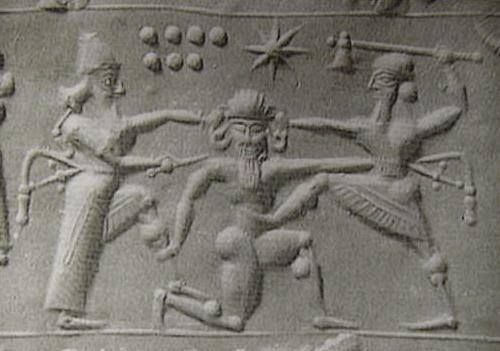 Gilgamesh, a Religious Character
Gilgamesh, a Religious Character
The Epic of Gilgamesh is filled with symbols. It contains visions that are symbolic, and explains what some of them mean. It also contains symbolic language and events. For example, in the middle of a battle between Gilgamesh and Enkidu, we find that everything calms suddenly, and Enkidu immediately stands and respectfully says to Gilgamesh:
As one unique your mother bore you,
. . . , godess Ninsun!
High over warriors you are exalted,
to be king of the people Enlil made it your destiny!
The question here is, if Enkidu knew this from the start, why did he fight him?! It makes no sense that what is meant by “battle” is a physical battle between Gilgamesh and Enkidu. Indeed, we can say that an ideological battle led Enkidu to eventually admit that Gilgamesh was the son of Ninsun and Enlil, who decreed in their will that Gilgamesh was to be king.
The fact that Enkidu said these words following the battle shows clearly that he venerates Ninsun and Enlil, yet did not acknowledge that Gilgamesh was from their lineage. Now he does:
As one unique your mother bore you,
. . . , goddess Ninsun!
High over warriors you are exalted,
to be king of the people Enlil made it your destiny!
For this reason, we must also give consideration to the symbolism within the texts, rather than considering the texts to be explicit and literal. As a matter of fact, this is almost always the case for religious texts in general, because they are from other worlds and contain wisdom. Sometimes the goal of these texts is to deliver a message to its people and perhaps there is a frequent need to protect it from imposters, by using symbols that only its people know. Visions, for example, are undoubtedly religious texts, but who among us doubts that they are often symbolic?!
The first journey of Gilgamesh was to kill the satan Humbaba and remove injustice, oppression, and evil from the earth:
Gilgamesh opened his mouth,
Saying to Enkidu:
. . . ferocious Humbaba
. . . [let us] slay him, [so his power] is no more!
‘In the Forest of Cedar, [where Humbaba] dwells,
let us frighten him in his lair!’ (George 2003, 18).
. . . [until we] we slay [ferocious Humbaba,]
[and annihilate] from [the land the Evil Thing…] (George 2003, 28).
Prior to Gilgamesh killing the satan, he sees many visions that bring him the good news of the success of his first mission:
‘My second dream sur[passes] the first.
In my dream, my friend, a mountain . . . ,
it threw me down, it held me by my feet . . .
The brightness grew more intense. A man [appeared],
the comeliest in the land, his beauty . . .
[From] beneath the mountain he pulled me out and . . .
He gave me water to drink and my heart grew [calm.]…(George 2003, 32).
From the Sumerian point of view, anything that is deified is considered a god. The worldly life is a god, the “I” is a god, any particular group is a god, and the righteous, holy ones are gods. That is why we can replace the word “god” with the words prophets, righteous ones, the worldly life or the “I”, and carefully reflect on the text and see ts rich wisdom:
Gilgamesh opened his mouth,
saying to Enkidu:
‘Who is there, my friend, can climb to the sky?
Only the gods [the righteous ones] [dwell] forever in sunlight.
As for man, his days are numbered,
whatever he may do, it is but wind (George 2003, 109-10).
The Quran says:
{And We will regard what they have done of deeds and make them as dust dispersed.} Quran Chapter “The Criterion” 25:23.
Gilgamesh, who is two-thirds god, eventually wanted to rid himself of his dark third, so he went to someone who had rid himself of the darkness and became immortal with the gods: his grandfather Utnapishtim (Noah). The journey of Gilgamesh to Noah was not a journey of seeking physical immortality like some of its readers imagine. Rather, it was a journey of seeking spiritual immortality.
After all that has been said, is it fair that a person objects when we say that the Epic of Gilgamesh is deservedly religious and that Gilgamesh is a religious character?